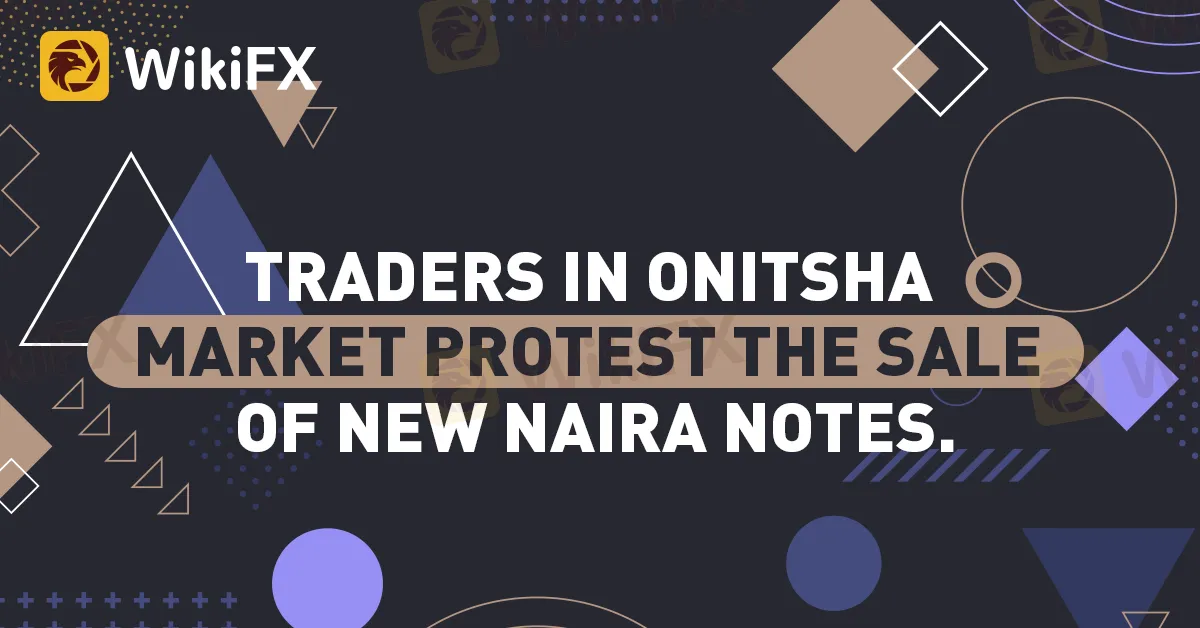简体中文
繁體中文
English
Pусский
日本語
ภาษาไทย
Tiếng Việt
Bahasa Indonesia
Español
हिन्दी
Filippiiniläinen
Français
Deutsch
Português
Türkçe
한국어
العربية
TRADERS IN ONITSHA MARKET PROTEST THE SALE OF NEW NAIRA NOTES.
Abstract:The selling of the redesigned N1000, N500, and N200 currency notes in the market by individuals suspected of being agents of local commercial banks has prompted traders at the Onitsha Main Market in Anambra State to complain to the Central Bank of Nigeria (CBN).

The selling of the redesigned N1000, N500, and N200 currency notes in the market by individuals suspected of being agents of local commercial banks has prompted traders at the Onitsha Main Market in Anambra State to complain to the Central Bank of Nigeria (CBN).
The dealers said that commercial banks were hesitant to distribute the new banknotes to the general people as a result of this “secret bargain”
When the CBN informed stakeholders about the redesign of the currency at the Onitsha Main Market, the traders protested to Benedict Maduagwu, the controller of the Anambra State branch of the bank.
As a result, Innocent Ezeoha, the chairman of Onitsha Main Market, pleaded with the CBN to release the new naira notes.
The CBN branch controller, Madugwu, responded by stating that the apex bank would going forward conduct surveillance on the commercial banks in the area over the development and warned the banks that every dollar issued to them had security codes.
The new note just released by the CBN of Nigeria has been a major controversial between traders especially people from the Onitsha Market.
He reiterated that commercial banks seen hoarding the new naira notes would face sanctions from the CBN.
The integrity of a local legal lender, the effectiveness of its supply, as well as its efficacy in the conduct of monetary policy, are some characteristics of a great central bank, he continued. “Currency management is a key function of the CBN as enshrined in Section 2(b) of the CBN Act 2007,” he said.
The integrity of the CBN and the nation have suffered unexpected repercussions as a result of recent issues that have grown in scope and sophistication for currency management in Nigeria. These difficulties mainly consist of: First, there has been a massive hoarding of currency by the general populace. According to statistics, just 15.29 percent of the cash in circulation is kept at the central bank, leaving 84.71 percent of it outside commercial banks' vaults.
Third, there is an increase in ease with which criminals can commit crimes and risk of counterfeiting, as indicated by various security reports received at the Central Bank of Nigeria. This is coupled with a bad view of the CBN and heightened risk to financial stability.
Given that: This approach will help to control inflation as the exercise will move the hoarded cash into the banking system, making monetary policy more effective. The benefits of the currency redesign to the Nigerian economy are enormous.
We would have far more reliable statistics on the money supply and monetary aggregates, which would also aid in the better design and implementation of monetary policy. This initiative, in our opinion, would contribute to broader financial inclusion, the development of a cashless society, and the formalization of the Nigerian economy.
Until January 31, 2023, when the present series no longer qualifies as legal money, the new design and current series shall circulate side by side. We advise the general population to make sure that their commercial banks get their cash holdings in these denominations.

Disclaimer:
The views in this article only represent the author's personal views, and do not constitute investment advice on this platform. This platform does not guarantee the accuracy, completeness and timeliness of the information in the article, and will not be liable for any loss caused by the use of or reliance on the information in the article.
Read more

Unleash Your Trading Skills: Join the WikiFX KOL India Trading Competition!
Are you ready to take your trading expertise to the next level? WikiFX is excited to announce an extraordinary India Trading Competition designed to connect passionate forex traders, enhance user engagement, and reward trading excellence!

Moomoo Financial & M1 Finance Face FINRA Sanctions for Influencer Misconduct
FINRA has fined Moomoo Financial and M1 Finance for failing to ensure compliance with regulatory standards in their social media influencer programmes, highlighting the growing need for robust oversight in digital marketing within the financial services industry.

Philippine Banks Launch PHPX Stablecoin to Transform Payments
Philippine banks introduce PHPX stablecoin, backed by bank collateral, to streamline $9T stablecoin transactions, remittances, and cross-border payments.

Bank of America Launches FX Services in the Philippines
Bank of America begins foreign exchange (FX) services in the Philippines, eyeing a share of the $300 billion onshore currency market. Learn about their growth plans.
WikiFX Broker
Latest News
Robinhood Launches Ethereum Staking with 100% Rewards Match
Kraken Closes NFT Marketplace Amid New Product Focus
Philippine Banks Launch PHPX Stablecoin to Transform Payments
Broker Review: Is FOREX.com a solid Broker?
Tether to Discontinue EURt Stablecoin Amid Regulatory Shifts in Europe
Adani’s Bribery Scandal! SEC Charges, Major Fallout & Adani’s Stand
Unleash Your Trading Skills: Join the WikiFX KOL India Trading Competition!
Bank of America Launches FX Services in the Philippines
PNP Uncovers Crypto Scams in Manila POGO Hub Raid
BSP Rolls Out Stricter Rules for Virtual Asset Providers
Currency Calculator


